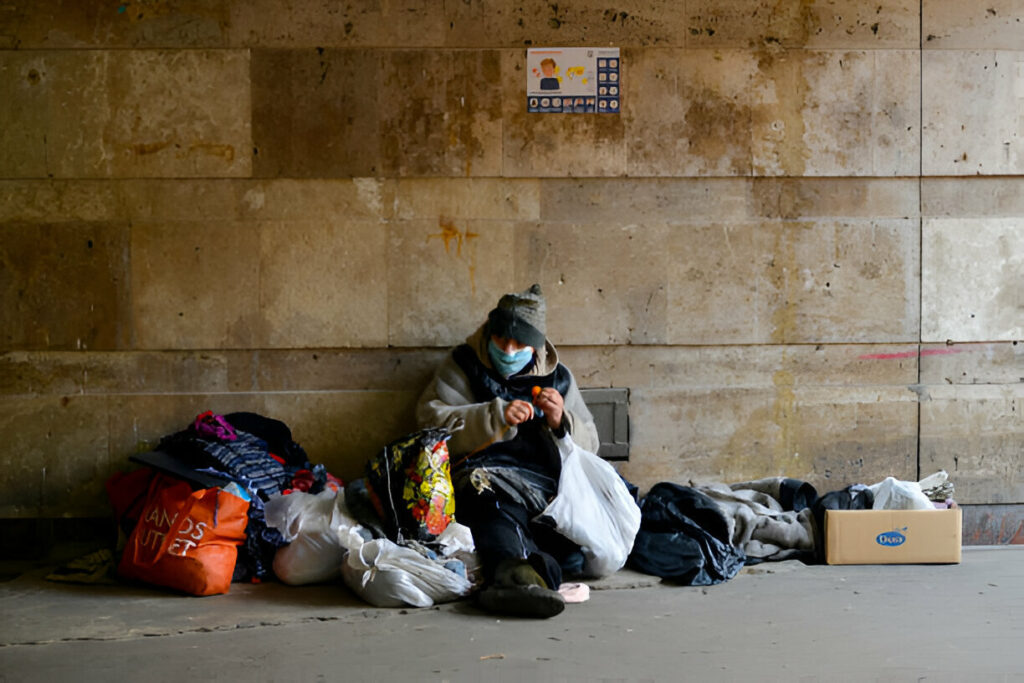
Homelessness is a global issue that transcends geographical and cultural boundaries. It encompasses a wide range of living situations, from sleeping on the streets to residing in temporary shelters. This article aims to deepen the understanding of who homeless people are and explore effective ways to offer support, acknowledging the complex nature of their circumstances, which can range from economic hardships to displacement due to crises.
Who Is a Homeless Person?
The term “homeless” refers to individuals who lack a fixed, regular, and adequate nighttime residence. This includes not only those living on the streets or staying in shelters but also people residing in makeshift or temporary accommodations due to a lack of better alternatives.
Homelessness encompasses more than just the absence of physical shelter; it is also characterized by social disconnection and heightened vulnerability. The causes of homelessness are diverse and often include economic downturns, scarcity of affordable housing, and family breakdowns.
Additionally, conflict and social upheaval can force communities to leave their homes, pushing individuals into homelessness as they search for safety. This sudden displacement often cuts people off from their social networks, jobs, and schools, making it even harder for them to find stable and secure living conditions. As they move into unfamiliar areas, often facing threats or discrimination, their chances of settling down safely are greatly reduced. This instability creates significant emotional and psychological challenges, complicating their path to recovery and stability.
Related Post: How Transform Ukraine Provided Housing for an IDP Family
Challenges Faced by the Homeless
Homeless individuals face numerous challenges beyond the absence of a physical home. Primarily, both groups struggle with extreme poverty and are often unable to meet basic personal needs such as food, clothing, and healthcare. The lack of a stable address can make it difficult to gain employment, access social services, and maintain relationships. Additionally, homelessness and displacement can lead to severe mental and physical health problems, exacerbated by the stress of living without security and comfort.
Health Risks
Living without a home significantly increases health risks. Homeless persons are exposed to extreme weather, poor nutrition, and unsanitary conditions that contribute to acute and chronic illnesses. Mental health issues such as depression and anxiety are prevalent among these groups due to isolation and chronic stress.
Social Stigma
Social stigma and discrimination often complicate the challenges faced by homeless individuals. The stigma attached to homelessness and displacement can prevent people from accessing needed services, further isolating them from society. It can also impact their self-esteem and overall mental well-being.
Displacement Specific Challenges
IDPs additionally face unique challenges such as the loss of community and cultural disconnection when they are forced to flee their homes due to conflict, disaster, or other crises. This upheaval often leads to long-term instability and difficulty in accessing education and health services, further complicating their path to recovery and integration.
5 Ways to Support Those Without Homes

Helping those without homes involves more than just offering immediate shelter. Here are some effective ways you can make a difference:
Offer Immediate Assistance
Donating essential items such as food, clothes, blankets, and personal hygiene products can make a significant difference in daily life by providing basic comfort and meeting urgent needs. Additionally, volunteering at shelters and soup kitchens offers direct ways to assist those in need, providing both immediate relief and personal connections.
Foster Community Involvement
Educating yourself and others about the causes and challenges faced by the unhoused is vital for fostering a compassionate community. Sharing this knowledge helps break down stereotypes and promote understanding. Engaging in or organizing community outreach programs provides direct assistance and mobilizes local support for vulnerable populations, enhancing the collective impact of these efforts.
Support Long-Term Health Care
Establishing access to long-term health care for the homeless can address both immediate and chronic health issues. This includes providing regular check-ups, treatment for chronic illnesses, and preventive care to improve their overall health outcomes. By ensuring that the homeless have access to continuous health care, we can help improve their quality of life and support their journey towards stability.
Provide Emotional Support
Showing compassion and respect towards individuals without homes can profoundly impact their mental and emotional well-being. Simple acts of kindness and treating them with dignity can uplift their spirits significantly. Additionally, being a compassionate listener can provide crucial emotional support to those who often feel ignored and marginalized, helping them feel recognized and valued within the community.
Support Long-Term Solutions
While immediate assistance is crucial, it often serves as a temporary fix that does not fully address the deeper issue of housing instability. Temporary shelters and emergency services, while vital, do not provide the stability needed for long-term recovery and reintegration into society. Advocating for policies that increase the availability of affordable housing is key to creating lasting change. Engaging with local and national governments to support legislation that promotes the development of affordable housing can significantly impact the lives of those without homes.
Supporting innovative housing solutions like tiny homes, modular housing, and rent-controlled apartments can provide stable, long-term accommodations that are not only cost-effective but also community-oriented. These housing models offer more than just shelter; they provide a sense of belonging and community, which is crucial for psychological and emotional well-being. Additionally, these sustainable strategies tackle the underlying causes of homelessness by offering a durable foundation for rebuilding lives. By focusing on long-term housing solutions, we can help alleviate the immediate difficulties faced by the homeless population and lay the groundwork for lasting stability and a hopeful future.
What Transform Ukraine is Doing to Help People Without Homes
The need for sustainable housing solutions is crucial, especially in contexts of conflict like we see in Ukraine. For Ukrainians committed to staying in their homeland, establishing stable, long-term housing is vital. Our response has been swift: as the conflict escalated, we set up several temporary housing locations, which were quickly filled to capacity.
To effectively address this, we launched the Tiny Homes project, which seeks to provide more than just a place to stay but a platform for families to rebuild their lives. These homes offer safety, stability, and the chance for residents to engage with their community and access local employment opportunities.
By supporting this initiative, you are not just contributing to a structure; you are helping to foster communities where families can thrive in a nurturing environment. Visit Rebuild Ukraine for more information on how you can help us provide homes for the homeless.
Related Articles: 15 Bible Verses About Helping the Homeless


